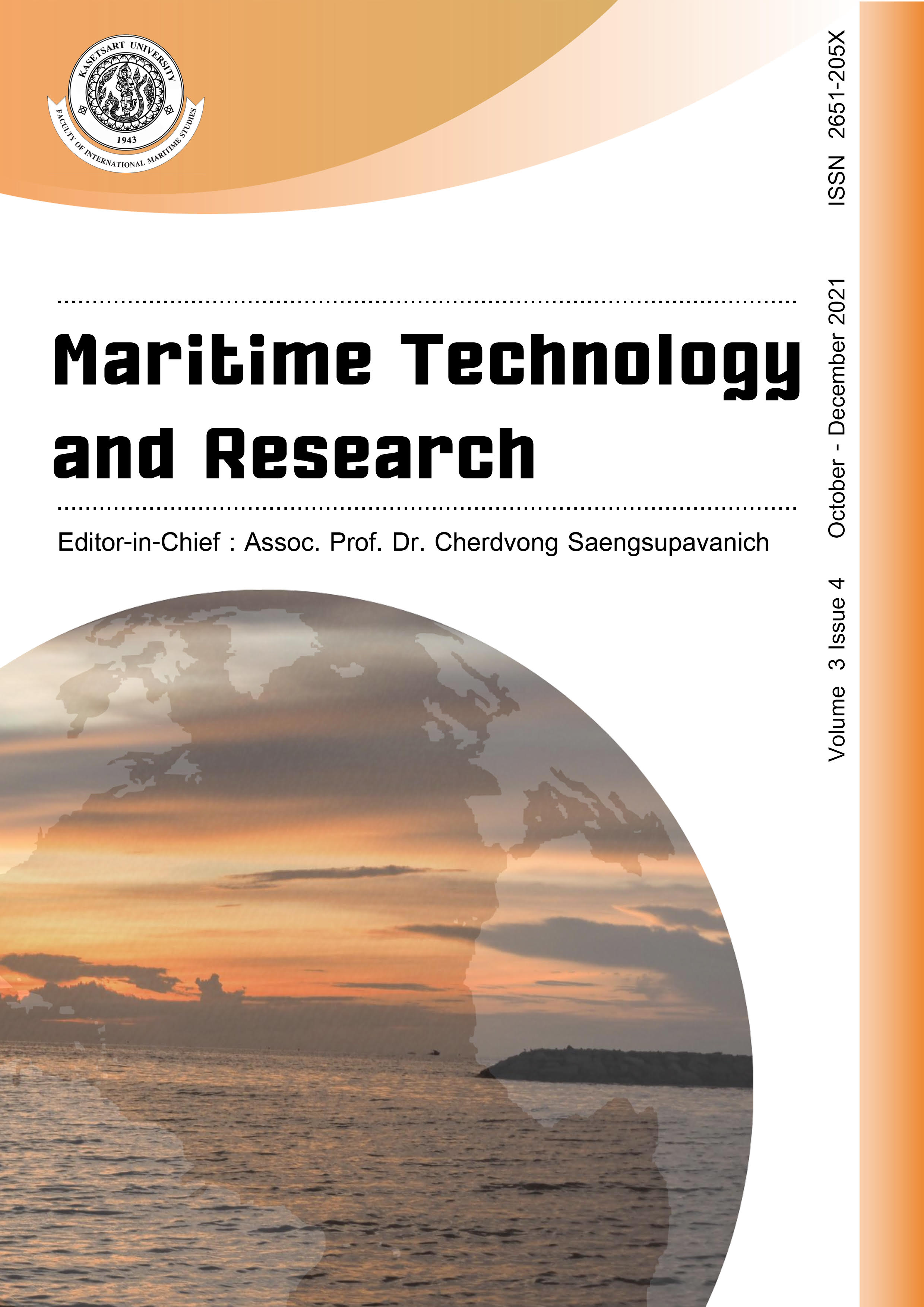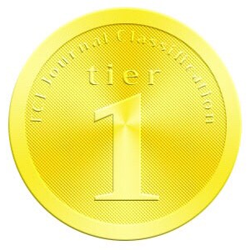A novel ship path following method in inland waterways based on adaptive feedforward PID control
DOI:
https://doi.org/10.33175/mtr.2021.252309Keywords:
Ship path following;, Adaptive Feedforward PID;, Lead compensator;, Course keeping;, Nomoto model., Ship path following, Adaptive feedforward PID, Lead compensator, Course keeping, Nomoto modelAbstract
Given the complex and time-varying external disturbances of inland waterways, designing an accurate path following controller is challenging. Based on the traditional PID controller, combined with the servo system model and the lead compensator, an adaptive feedforward PID controller for path following of ships in inland waterways is designed, considering ship maneuverability and external disturbances. Simulations of a ship in a curved channel in different scenarios are carried out to illustrate the effectiveness of the proposed path following method. Compared with the traditional path following controller, the proposed one, based on adaptive feedforward PID control, has favorable relative stability, anti-interference ability, and high steady-state precision in inland waterways.
References
Adolphe, K., Zhang, Y., Mbyamm, M., & Ouattara, S. (2020). PID controller parameters enhanced founded on Artificial Fish Swarm Algorithm. Journal of Physics: Conference Series, 1457, 012003. doi:10.1088/1742-6596/1457/1/012003
Amerongen, J. V. (1984). Adaptive steering of ships: A model-reference approach to improved manoeuvring and economical course keeping. Automatica, 20(1), 3-14. doi:
1016/0005-1098(84)90060-8
Bhattacharya, S., & Gupta, D. (2014). Target path iteration method for trajectory control of ships. Applied Ocean Research, 48, 55-65. doi:10.1016/j.apor.2014.07.012
Borhaug, E., Pavlov, A., & Pettersen, K. Y. (2008). Integral LOS control for path following of underactuated marine surface vessels in the presence of constant ocean currents (pp. 4984-4991). In Proceedings of the 47th IEEE Conference on Decision and Control 2008. Cancun, Mexico. doi:10.1109/CDC.2008.4739352
Børhaug, E., Pavlov, A., Panteley, E., & Pettersen, K. Y. (2011). Straight line path following for formations of underactuated marine surface vessels. IEEE Transactions on Control Systems Technology, 19(3), 493-506. doi:10.1109/TCST.2010.2050889
Borrie, J. (1987). Modern control systems: A manual of design methods. Automatica, 23(6), 804-805. doi:10.1016/0005-1098(87)90045-8
Boxu, M., & Zhang, X. (2021). Concise robust fuzzy nonlinear feedback track keeping control for ships using multi-technique improved LOS guidance. Ocean Engineering, 224, 108734. doi:10.1016/j.oceaneng.2021.108734
Breivik, M., & Fossen, T. (2004). Path following for marine surface vessels. IEEE Techno-Ocean, 4, 2282-2289. doi:10.1109/OCEANS.2004.1406507
Budak, G., & Beji, S. (2020). Controlled course-keeping simulations of a ship under external disturbances. Ocean Engineering, 218, 108126. doi: 10.1016/j.oceaneng.2020.108126
Cheng, X., Zhou, C., Zhou, L., Gan, L., Xiao, C., & Jiang, F. (2019). Research on ship track control in bridge area based on differential evolution algorithm (pp. 215-221). In Proceedings of the 5th International Conference on Transportation Information and Safety 2019. Liverpool, UK. doi:10.1109/ICTIS.2019.8883781
Cheng, Z., & Hong, X. (2012). PID controller parameters optimization based on artificial fish swarm algorithm (pp. 265-268). In Proceedings of the 5th International Conference on Intelligent Computation Technology and Automation. Zhangjiajie, China. doi:10.1109/icicta.2012.73
Chengming, Y., & Zaojian, L. (2018). A fuzzy PID autopilot for ship steering based on membership function optimized by an improved genetic algorithm. Journal of Multiple-Valued Logic & Soft Computing, 30(4-6), 559-572.
Deng, Y., Xianku, Z., & Guoqing, Z. (2019). Fuzzy logic based speed optimization and path following control for sail-assisted ships. Ocean Engineering, 171, 300-310. doi:10.1016/j.oceaneng.2018.11.006
Do, K. D. (2016). Global robust adaptive path-tracking control of underactuated ships under stochastic disturbances. Ocean Engineering, 111, 267-278. doi:10.1016/j.oceaneng.2015.10.038
Do, K. D., & Pan, J. (2004). State- and output-feedback robust path-following controllers for underactuated ships using Serret-Frenet frame. Ocean Engineering, 31, 587-613. doi:10.1016/j.oceaneng.2003.08.006
Do, K. D., Jiang, Z. P., & Pan, J. (2004). Robust adaptive path following of underactuated ships. Automatica, 40, 929-944. doi:10.1016/j.automatica.2004.01.021
Du, J., Xin, H., & Sun, Y. (2017). Adaptive robust nonlinear control design for course tracking of ships subject to external disturbances and input saturation. IEEE Transactions on Systems, Man, and Cybernetics: Systems, 50(1), 193-202. doi:10.1109/TSMC.2017.2761805
Dyda, A. A., Chinchukova, E. P., Oskin, D. A., & Monteriù, A. (2019). An effective and simple adaptive algorithm for ship course control systems (pp. 1-6). In Proceedings of the 2019 International Multi-Conference on Industrial Engineering and Modern Technologies. Vladivostok, Russia. doi:10.1109/FarEastCon.2019.8933822
Format, I. P. (2014). A novel adaptive neural control scheme for uncertain ship course-keeping system. Sensors & Transducers Journal, 178(9), 282-285.
Fossen, T. (2011). Handbook of marine craft hydrodynamics and motion control. John Wiley & Sons, 2011. doi:10.1002/9781119994138
Gao, M. Z., Huang, X., & Hong, J. P. (2007). Application of MATLAB and simulink in teaching of automatic control principles. Retrieved from http://en.cnki.com.cn/Article_en/CJFDTotal-HBSF200701025.htm
He, X., Chen, W., Zhu, B., & Cook, C. (2011). Multifactor optimization of a fuzzy-PID controller using genetic algorithm. Advanced Materials Research, 422, 268-275. doi:10.4028/www.scientific.net/AMR.422.268
Jiang, M., Zhang, Z. K., & Dong, D. Y. (2006). A quantum switching architecture on the basis of limited nonlocal operation. The Journal of China Universities of Posts and Telecommunications, 13(4), 91-94, doi:10.1016/S1005-8885(07)60041-7
Kahveci, N., & Ioannou, P. (2013). Adaptive steering control for uncertain ship dynamics and stability analysis. Automatica,, 49, 685-697. doi:10.1016/j.automatica.2012.11.026
Kumar, E., & Elangovan, G. (2017). Cascade PID-lead compensator controller for non-overshoot time responses of unstable system. Energy Procedia, 117, 708-715. doi:10.1016/j.egypro.2017.05.185
Li, Z., Hu, J., & Huo, X. (2012). PID control based on RBF neural network for ship steering (pp. 1076-1080). In Proceedings of the 2012 World Congress on Information and Communication Technologies. Trivandrum, India. doi:10.1109/WICT.2012.6409235
Liangqi, L., Renxiang, B., Wuchen, S., & Xinyu, L. (2019). Ship track-keeping control based on sliding mode variable structure pid controller and particle swarm optimization (pp. 887-891). In Proceedings of the 6th International Conference on Information Science and Control Engineering. Shanghai, China. doi:10.1109/ICISCE48695.2019.00180
Liu, L., Wang, D., & Peng, Z. (2015). Path following of marine surface vehicles with dynamical uncertainty and time-varying ocean disturbances. Neurocomputing, 173, 033. doi:10.1016/j.neucom.2015.08.033
Monje, C., Calderón, A., Vinagre, B., & Feliu, V. (2004). The fractional order lead compensator (pp. 347-352). In Proceedings of the 2nd IEEE International Conference on Computational Cybernetics. Vienna, Austria. doi :10.1109/ICCCYB.2004.1437746
Moreira, L., Fossen, T., & Guedes, C. S. (2007). Path following control system for a tanker ship model. Ocean Engineering, 34, 2074-2085. doi:10.1016/j.oceaneng.2007.02.005
Nie, Z. Y., Wang, Q. G., Wu, M., & He, Y. (2011). Lead/Lag compensator design for unstable delay processes based on new gain and phase margin specifications. Industrial & Engineering Chemistry Research, 50(3), 133001337. doi: 10.1021/ie1007322
Perera, L., & Guedes, C. S. (2013). Lyapunov and Hurwitz based controls for input-output linearisation applied to nonlinear vessel steering. Ocean Engineering, 66, 58-68. doi:10.1016/j.oceaneng.2013.04.002
Rohitha, P. D., Senadheera, S., & Pieper, J. K. (2005). Fully automated PID and lead/lag compensator design tool for industrial use (pp. 1009-1014). In Proceedings of the 2005 IEEE Conference on Control Applications. Toronto, Canada. doi:10.1109/CCA.2005.1507262
Saeed, R. (2012). Nonlinear closed loop optimal control: A modified state-dependent Riccati equation. ISA transactions, 52(2), 285-290. doi:10.1016/j.isatra.2012.10.005
Sun, J., Wang, R., Kang, Y., Miao, K., & Hua, D. (2017). Application of genetic algorithm and neural network in ship's heading pid tracking control. In Proceedings of the International Conference on Mechatronics and Intelligent Robotics 2017. Springer, Cham. doi:10.1007/978-3-319-70990-1_64
Thomsen, J., Blanke, M., Reid, R. E., & Youhanaie, M. J. S. (2014). The impact of analog and bang-bang steering gear control on ship's fuel economy. In Proceedings of the 4th International Symposium on Ship Operation Autpomation. Genova. doi: 10.13140/2.1.1869.0562
Tomera, M. (2014). Ant colony optimization algorithm applied to ship steering control. Procedia Computer Science, 35, 83-92. doi:10.1016/j.procs.2014.08.087
Tomera, M. (2017). Fuzzy self-tuning PID controller for a ship autopilot (pp. 93-103). In Proceedings of the 12th International Conference on Marine Navigation and Safety of Sea Transportation. Gdynia, Poland. doi :10.1201/9781315099132-15
Tzeng, C. Y., Goodwin, G., & Crisafulli, S. (1999). Feedback linearization design of a ship steering autopilot with saturating and slew rate limiting actuator. International Journal of Adaptive Control and Signal Processing, 13, 23-30. doi:10.1002/(SICI)1099-1115(199902)13:1<23::AID-ACS532>3.0.CO;2-E
Velagic, J., & Vukić, Z. (2004). The improving of neural network capabilities in on-line identification and tracking control of ship (pp. 1-6). In Proceedings of the IEEE International Conference on Methods and Models in Automation and Robotics. Miedzyzdroje, Poland.
Velagic, J., Vukić, Z., & Omerdic, E. (2003). Adaptive fuzzy ship autopilot for track-keeping. Control Engineering Practice, 11(4), 433-443. doi:10.1016/S0967-0661(02)00009-6
Wang, C. X., Liu, J. H., Shen, H. H., & Dai, M. J. (2009). Design of a lag-lead compensator for the photo-electric platform servo system based on MATLAB. Retrieved from http://www.xjishu.com/en/111/y621340.html
Wen, Y., Tao, W., Zhu, M., Zhou, J., & Xiao, C. (2020). Characteristic model-based path following controller design for the unmanned surface vessel. Applied Ocean Research, 101, 102293. doi:10.1016/j.apor.2020.102293
Witkowska, A., & Smierzchalski, R. (2007). The use of backstepping method to ship course controller. International Journal on Marine Navigation and Safety of Sea Transportation, 1(3), 313-317.
Witkowska, A., & Smierzchalski, R. (2009). Nonlinear backstepping ship course controller. International Journal of Automation and Computing, 6(3), 277-284. doi:10.1007/s11633-009-0277-2
Witkowska, A., Tomera, M., & Smierzchalski, R. (2007). A backstepping approach to ship course control. Applied Mathematics and Computer Science, 17, 73-85. doi:10.2478/v10006-007-0007-2
Yang, S., Wang, H., Liu, J., Cai, H., & Cao, B. (2011). Study of efficient ship heading controller (pp. 4991-4994). In Proceedings of the 2011 International Conference on Electrical and Control Engineering. Yichang, China. doi:10.1109/ICECENG.2011.6058102
Zhan, Y. L. (2003). The study on neural network control of self-adjusted PID parameters for ship maneuvering. Ship Science and Technology, 25(5), 20-23. doi:CNKI:SUN:JCKX.0.2003-05-006.
Zhang, G., & Zhang, X. (2014). Concise robust adaptive path-following control of underactuated ships using DSC and MLP. IEEE Journal of Oceanic Engineering, 39, 685-694. doi:10.1109/JOE.2013.2280822
Zhang, X. K., Wang X. P., & Zhu, L. (2008). Further thinking on Nomoto model for ships. Journal of Marine Technology, 30(2), 2-4. doi:CNKI:SUN:HHJS.0.2008-02-002
Zhang, X., Han, X., Guan, W., & Zhang, G. (2019). Improvement of integrator backstepping control for ships with concise robust control and nonlinear decoration. Ocean Engineering, 189, 106349. doi:10.1016/j.oceaneng.2019.106349
Downloads
Published
Issue
Section
License
Copyright: CC BY-NC-ND 4.0








